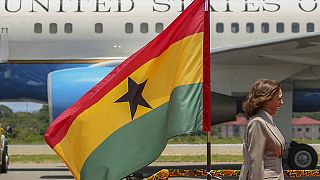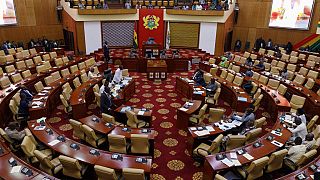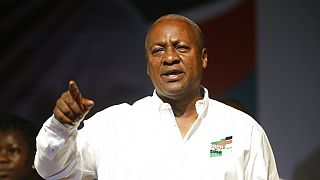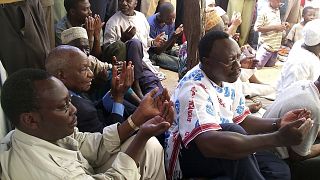Ghana
Ghana is experiencing a deep economic crisis, with a rampant inflation that has reached almost 40% and its currency that has fallen by almost half compared to the US dollar.
The government's finances are also at their lowest point in years.
President Nana Akufo-Addo, who has faced several protests in the West African country because of the situation, admitted that Ghana is in crisis and blamed what he called "malevolent forces…that have come together at the same time" referring to the COVID and Russia's invasion of Ukraine.
Ghana, along with many African economies, was still recovering from the pandemic when it was hit by the global increase in theprice of food and energy, caused by the war in Ukraine. But the country also had to deal with the fell of the Cedi - its currency - that has been one of the world's worst performing against the dollar this year
Home of 31 million people, Ghana is now one of the most affected by the crisis in the region, and that's heavily felt for those who rely on imports and depend on the dollar to obtain their products.
"The amount you will use to import let's say one container; these days, you have to double the amount. The same goods, the same quantity but the amount has been doubled," said Obeng Krampah, a businessman from Accra who imports used home and office furniture from Europe and America to sell in Ghana,
"I have used dollar to buy the goods, paid freight, and then calculating duty in dollar for me to pay so when the goods is out, definitely I have to factor everything inside, so the final consumer is bearing the whole cost," he added.
But for the consumers the situation is also difficult, less people spend in non essential things, and that's felt by the shopkeepers and business people in the capital of the country.
Mary Sarfoa is an entrepreneur that has worked for more than 30 years importing used sofas from Europe.
"Previously, the longest time I would take to sell my wares is within one or two months then I go back (to Europe to buy) but this time, it's been four months since my last import and I have only sold three sofas," she said, "If you look behind me, we have so many packed sofas, even the container is full, the economy is not going well," she complained, showing her products.
The Importers and Exporters Association of Ghana have been reeling over challenges leading to months of uncertainty.
Samson Asaki Awingobit, the Executive secretary of the association, said that like Sarfoa and Krampah, the situation is affecting a lot of business that have either been forced to shut down or stopped importing.
"Every businessman that is in this country has lost sales, month by month over 50%," he said. "Many people are winding up or stopping from importing into this country."
Ghana's government blamed the pandemic and the war in Ukraine as some of the drivers of the economic crisis, but analysts think that the poor performance of the country to help investors to make business is also a factor to consider.
Louis Yaw Afful, an international trade analyst, said infrastructure development, the energy prices as well as business governance - how simple it is to do business in the country - influence the decision of investors.
"Once we (Ghana) ignored those sides for some time and we are underperforming, they (investors) will look for the competitive country that has all these as a one," he said.
Ghana's cost of living has risen exponentially with inflation reaching almost 40%, one of the highest levels in the last years.
Last week the government said it has agreed on a debt management strategy with the IMF as the country faces high risk of debt distress.
The country's finance minister, Ken Ofori-Atta told the parliament that to deal with the crisis, Ghana will freeze hiring of public and civil servants among other measures.





![Africa's hight cost of climate change [Business Africa]](https://static.euronews.com/articles/stories/08/77/73/84/320x180_cmsv2_065e40c7-90d8-5143-b8da-c4885db015dc-8777384.jpg)







11:07
Botswana's new government races to diversify its economy {Business Africa}
11:07
Benin: Tapping the potential of luxury tourism [Business Africa]
Go to video
US announces visa restrictions for Ghana
01:28
Putin says BRICS countries will drive economic growth in coming years
Go to video
Zimbabwe to compensate white farmers 20 years after land seizures
01:04
Controversy surrounds Ghana's unpassed anti-LGBTQ law